Impact of Motivation on Employee Experience: A Comprehensive Report
VerifiedAdded on 2023/06/14
|7
|1903
|103
Report
AI Summary
This report examines the multifaceted world of work, focusing on the factors that drive employee motivation and the positive and negative experiences that shape their job roles. It delves into motivational theories, particularly Maslow's Hierarchy of Needs, to understand the underlying drivers of employee behavior, such as salary, rewards, and work environment. The report also analyzes the dual nature of employee experiences, highlighting skill development and modern performance management as positive factors, while addressing bias, workplace conflict, and excessive workload as negative aspects. Strategies for mitigating these negative factors, such as effective leadership and providing opportunities for employees to express their opinions, are also discussed. The ultimate goal is to provide insights into creating a more engaging and productive work environment by understanding and addressing the key elements that influence employee motivation and overall job satisfaction. Desklib provides various resources to students, including solved assignments and past papers.

World of Work
Paraphrase This Document
Need a fresh take? Get an instant paraphrase of this document with our AI Paraphraser
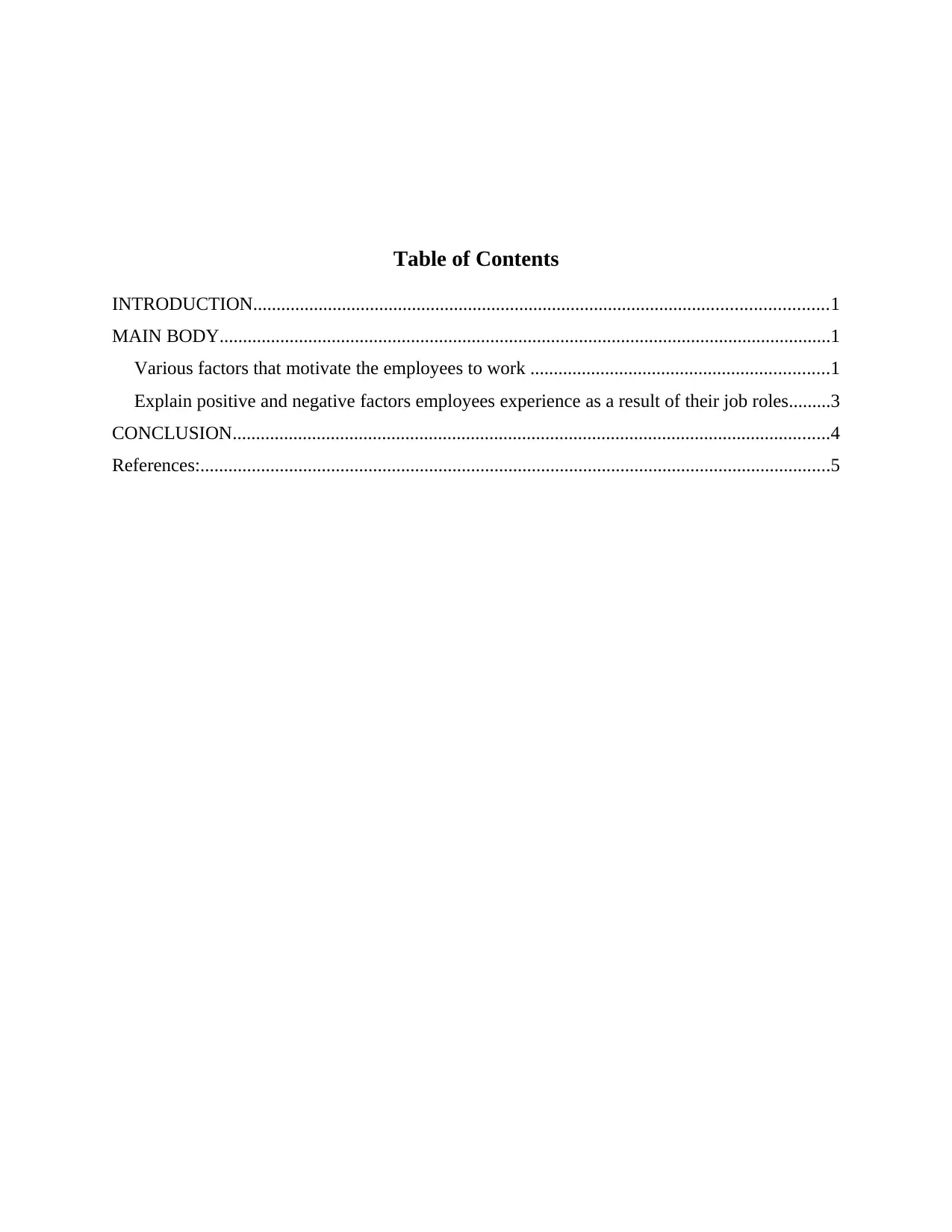
Table of Contents
INTRODUCTION...........................................................................................................................1
MAIN BODY...................................................................................................................................1
Various factors that motivate the employees to work ................................................................1
Explain positive and negative factors employees experience as a result of their job roles.........3
CONCLUSION................................................................................................................................4
References:.......................................................................................................................................5
INTRODUCTION...........................................................................................................................1
MAIN BODY...................................................................................................................................1
Various factors that motivate the employees to work ................................................................1
Explain positive and negative factors employees experience as a result of their job roles.........3
CONCLUSION................................................................................................................................4
References:.......................................................................................................................................5
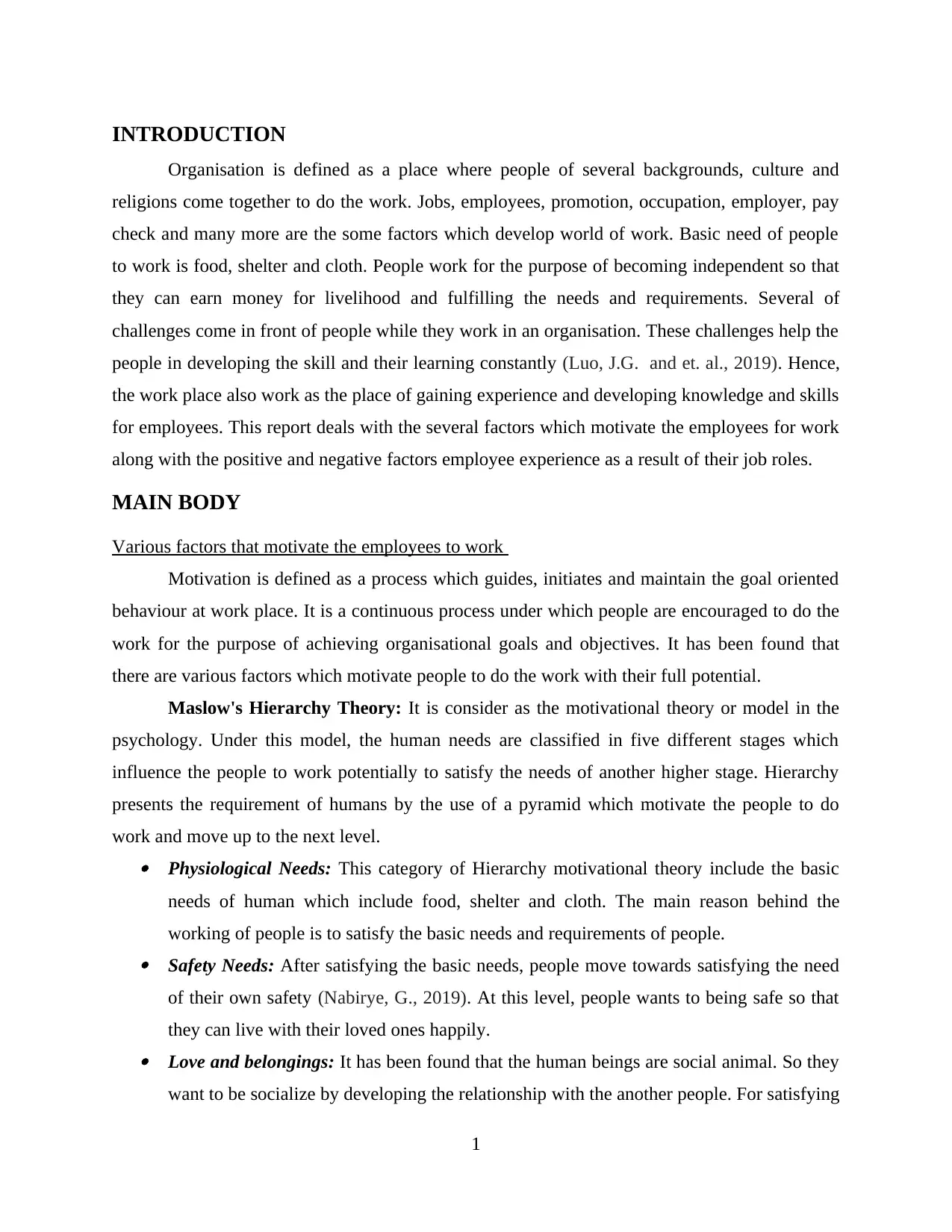
INTRODUCTION
Organisation is defined as a place where people of several backgrounds, culture and
religions come together to do the work. Jobs, employees, promotion, occupation, employer, pay
check and many more are the some factors which develop world of work. Basic need of people
to work is food, shelter and cloth. People work for the purpose of becoming independent so that
they can earn money for livelihood and fulfilling the needs and requirements. Several of
challenges come in front of people while they work in an organisation. These challenges help the
people in developing the skill and their learning constantly (Luo, J.G. and et. al., 2019). Hence,
the work place also work as the place of gaining experience and developing knowledge and skills
for employees. This report deals with the several factors which motivate the employees for work
along with the positive and negative factors employee experience as a result of their job roles.
MAIN BODY
Various factors that motivate the employees to work
Motivation is defined as a process which guides, initiates and maintain the goal oriented
behaviour at work place. It is a continuous process under which people are encouraged to do the
work for the purpose of achieving organisational goals and objectives. It has been found that
there are various factors which motivate people to do the work with their full potential.
Maslow's Hierarchy Theory: It is consider as the motivational theory or model in the
psychology. Under this model, the human needs are classified in five different stages which
influence the people to work potentially to satisfy the needs of another higher stage. Hierarchy
presents the requirement of humans by the use of a pyramid which motivate the people to do
work and move up to the next level. Physiological Needs: This category of Hierarchy motivational theory include the basic
needs of human which include food, shelter and cloth. The main reason behind the
working of people is to satisfy the basic needs and requirements of people. Safety Needs: After satisfying the basic needs, people move towards satisfying the need
of their own safety (Nabirye, G., 2019). At this level, people wants to being safe so that
they can live with their loved ones happily. Love and belongings: It has been found that the human beings are social animal. So they
want to be socialize by developing the relationship with the another people. For satisfying
1
Organisation is defined as a place where people of several backgrounds, culture and
religions come together to do the work. Jobs, employees, promotion, occupation, employer, pay
check and many more are the some factors which develop world of work. Basic need of people
to work is food, shelter and cloth. People work for the purpose of becoming independent so that
they can earn money for livelihood and fulfilling the needs and requirements. Several of
challenges come in front of people while they work in an organisation. These challenges help the
people in developing the skill and their learning constantly (Luo, J.G. and et. al., 2019). Hence,
the work place also work as the place of gaining experience and developing knowledge and skills
for employees. This report deals with the several factors which motivate the employees for work
along with the positive and negative factors employee experience as a result of their job roles.
MAIN BODY
Various factors that motivate the employees to work
Motivation is defined as a process which guides, initiates and maintain the goal oriented
behaviour at work place. It is a continuous process under which people are encouraged to do the
work for the purpose of achieving organisational goals and objectives. It has been found that
there are various factors which motivate people to do the work with their full potential.
Maslow's Hierarchy Theory: It is consider as the motivational theory or model in the
psychology. Under this model, the human needs are classified in five different stages which
influence the people to work potentially to satisfy the needs of another higher stage. Hierarchy
presents the requirement of humans by the use of a pyramid which motivate the people to do
work and move up to the next level. Physiological Needs: This category of Hierarchy motivational theory include the basic
needs of human which include food, shelter and cloth. The main reason behind the
working of people is to satisfy the basic needs and requirements of people. Safety Needs: After satisfying the basic needs, people move towards satisfying the need
of their own safety (Nabirye, G., 2019). At this level, people wants to being safe so that
they can live with their loved ones happily. Love and belongings: It has been found that the human beings are social animal. So they
want to be socialize by developing the relationship with the another people. For satisfying
1
⊘ This is a preview!⊘
Do you want full access?
Subscribe today to unlock all pages.

Trusted by 1+ million students worldwide
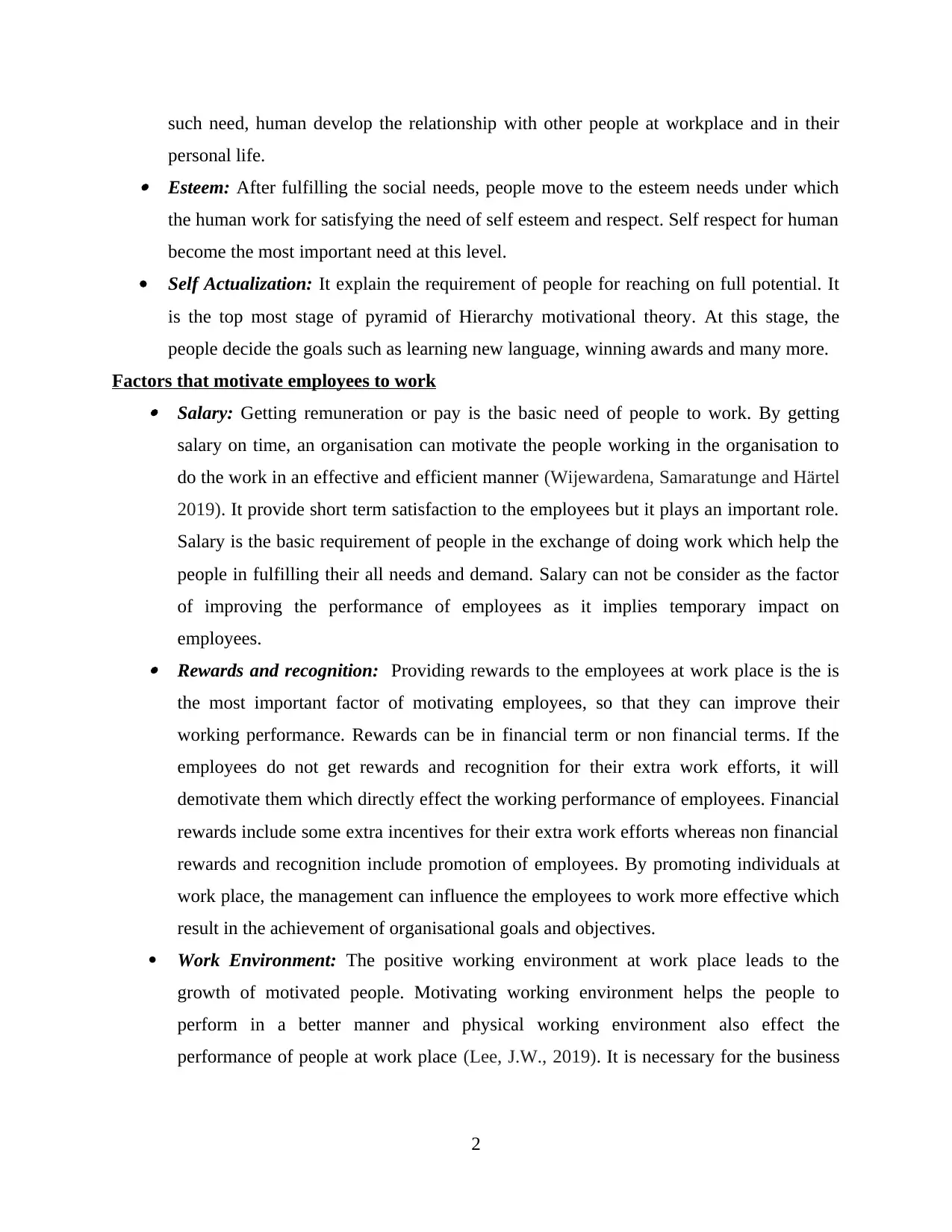
such need, human develop the relationship with other people at workplace and in their
personal life. Esteem: After fulfilling the social needs, people move to the esteem needs under which
the human work for satisfying the need of self esteem and respect. Self respect for human
become the most important need at this level.
Self Actualization: It explain the requirement of people for reaching on full potential. It
is the top most stage of pyramid of Hierarchy motivational theory. At this stage, the
people decide the goals such as learning new language, winning awards and many more.
Factors that motivate employees to work Salary: Getting remuneration or pay is the basic need of people to work. By getting
salary on time, an organisation can motivate the people working in the organisation to
do the work in an effective and efficient manner (Wijewardena, Samaratunge and Härtel
2019). It provide short term satisfaction to the employees but it plays an important role.
Salary is the basic requirement of people in the exchange of doing work which help the
people in fulfilling their all needs and demand. Salary can not be consider as the factor
of improving the performance of employees as it implies temporary impact on
employees. Rewards and recognition: Providing rewards to the employees at work place is the is
the most important factor of motivating employees, so that they can improve their
working performance. Rewards can be in financial term or non financial terms. If the
employees do not get rewards and recognition for their extra work efforts, it will
demotivate them which directly effect the working performance of employees. Financial
rewards include some extra incentives for their extra work efforts whereas non financial
rewards and recognition include promotion of employees. By promoting individuals at
work place, the management can influence the employees to work more effective which
result in the achievement of organisational goals and objectives.
Work Environment: The positive working environment at work place leads to the
growth of motivated people. Motivating working environment helps the people to
perform in a better manner and physical working environment also effect the
performance of people at work place (Lee, J.W., 2019). It is necessary for the business
2
personal life. Esteem: After fulfilling the social needs, people move to the esteem needs under which
the human work for satisfying the need of self esteem and respect. Self respect for human
become the most important need at this level.
Self Actualization: It explain the requirement of people for reaching on full potential. It
is the top most stage of pyramid of Hierarchy motivational theory. At this stage, the
people decide the goals such as learning new language, winning awards and many more.
Factors that motivate employees to work Salary: Getting remuneration or pay is the basic need of people to work. By getting
salary on time, an organisation can motivate the people working in the organisation to
do the work in an effective and efficient manner (Wijewardena, Samaratunge and Härtel
2019). It provide short term satisfaction to the employees but it plays an important role.
Salary is the basic requirement of people in the exchange of doing work which help the
people in fulfilling their all needs and demand. Salary can not be consider as the factor
of improving the performance of employees as it implies temporary impact on
employees. Rewards and recognition: Providing rewards to the employees at work place is the is
the most important factor of motivating employees, so that they can improve their
working performance. Rewards can be in financial term or non financial terms. If the
employees do not get rewards and recognition for their extra work efforts, it will
demotivate them which directly effect the working performance of employees. Financial
rewards include some extra incentives for their extra work efforts whereas non financial
rewards and recognition include promotion of employees. By promoting individuals at
work place, the management can influence the employees to work more effective which
result in the achievement of organisational goals and objectives.
Work Environment: The positive working environment at work place leads to the
growth of motivated people. Motivating working environment helps the people to
perform in a better manner and physical working environment also effect the
performance of people at work place (Lee, J.W., 2019). It is necessary for the business
2
Paraphrase This Document
Need a fresh take? Get an instant paraphrase of this document with our AI Paraphraser
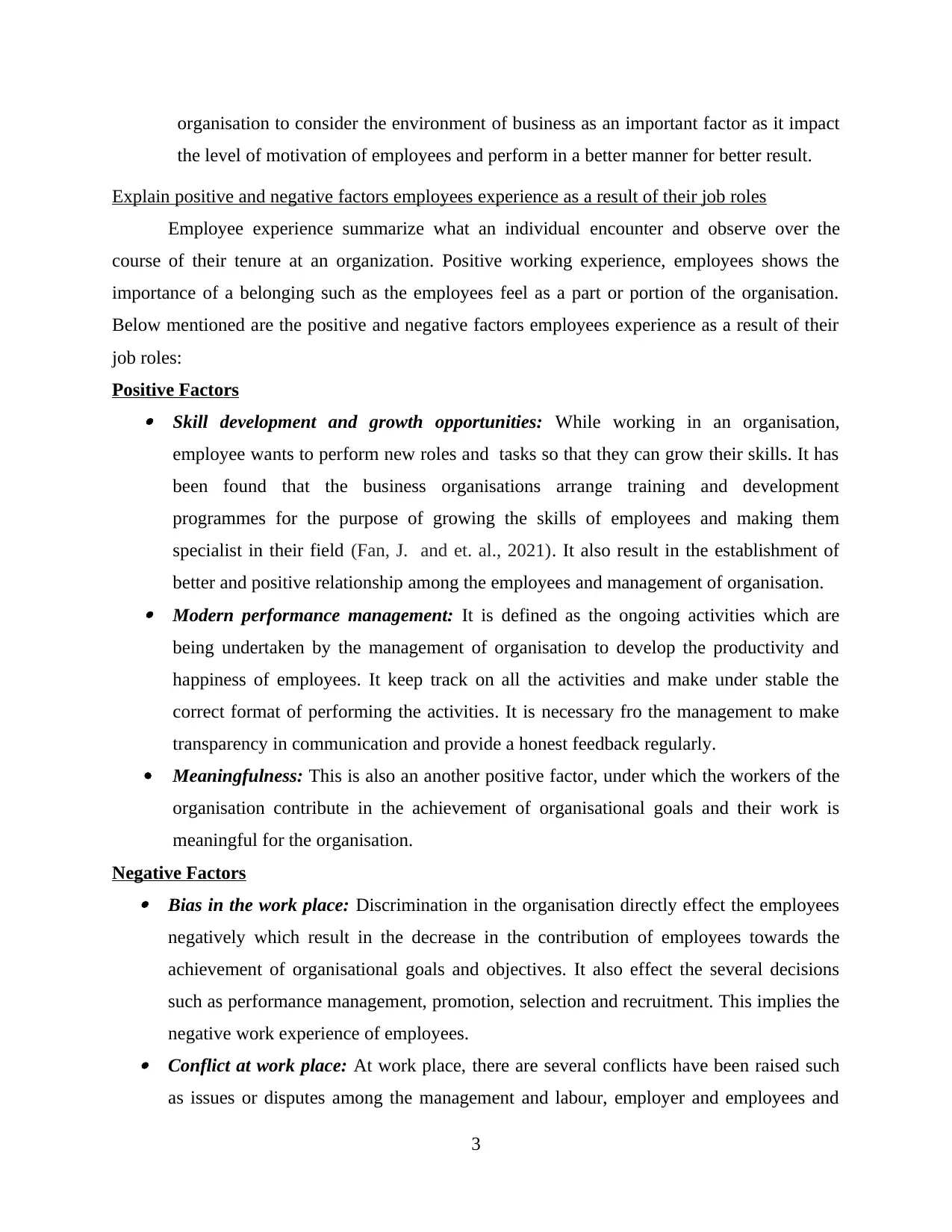
organisation to consider the environment of business as an important factor as it impact
the level of motivation of employees and perform in a better manner for better result.
Explain positive and negative factors employees experience as a result of their job roles
Employee experience summarize what an individual encounter and observe over the
course of their tenure at an organization. Positive working experience, employees shows the
importance of a belonging such as the employees feel as a part or portion of the organisation.
Below mentioned are the positive and negative factors employees experience as a result of their
job roles:
Positive Factors Skill development and growth opportunities: While working in an organisation,
employee wants to perform new roles and tasks so that they can grow their skills. It has
been found that the business organisations arrange training and development
programmes for the purpose of growing the skills of employees and making them
specialist in their field (Fan, J. and et. al., 2021). It also result in the establishment of
better and positive relationship among the employees and management of organisation. Modern performance management: It is defined as the ongoing activities which are
being undertaken by the management of organisation to develop the productivity and
happiness of employees. It keep track on all the activities and make under stable the
correct format of performing the activities. It is necessary fro the management to make
transparency in communication and provide a honest feedback regularly.
Meaningfulness: This is also an another positive factor, under which the workers of the
organisation contribute in the achievement of organisational goals and their work is
meaningful for the organisation.
Negative Factors Bias in the work place: Discrimination in the organisation directly effect the employees
negatively which result in the decrease in the contribution of employees towards the
achievement of organisational goals and objectives. It also effect the several decisions
such as performance management, promotion, selection and recruitment. This implies the
negative work experience of employees. Conflict at work place: At work place, there are several conflicts have been raised such
as issues or disputes among the management and labour, employer and employees and
3
the level of motivation of employees and perform in a better manner for better result.
Explain positive and negative factors employees experience as a result of their job roles
Employee experience summarize what an individual encounter and observe over the
course of their tenure at an organization. Positive working experience, employees shows the
importance of a belonging such as the employees feel as a part or portion of the organisation.
Below mentioned are the positive and negative factors employees experience as a result of their
job roles:
Positive Factors Skill development and growth opportunities: While working in an organisation,
employee wants to perform new roles and tasks so that they can grow their skills. It has
been found that the business organisations arrange training and development
programmes for the purpose of growing the skills of employees and making them
specialist in their field (Fan, J. and et. al., 2021). It also result in the establishment of
better and positive relationship among the employees and management of organisation. Modern performance management: It is defined as the ongoing activities which are
being undertaken by the management of organisation to develop the productivity and
happiness of employees. It keep track on all the activities and make under stable the
correct format of performing the activities. It is necessary fro the management to make
transparency in communication and provide a honest feedback regularly.
Meaningfulness: This is also an another positive factor, under which the workers of the
organisation contribute in the achievement of organisational goals and their work is
meaningful for the organisation.
Negative Factors Bias in the work place: Discrimination in the organisation directly effect the employees
negatively which result in the decrease in the contribution of employees towards the
achievement of organisational goals and objectives. It also effect the several decisions
such as performance management, promotion, selection and recruitment. This implies the
negative work experience of employees. Conflict at work place: At work place, there are several conflicts have been raised such
as issues or disputes among the management and labour, employer and employees and
3
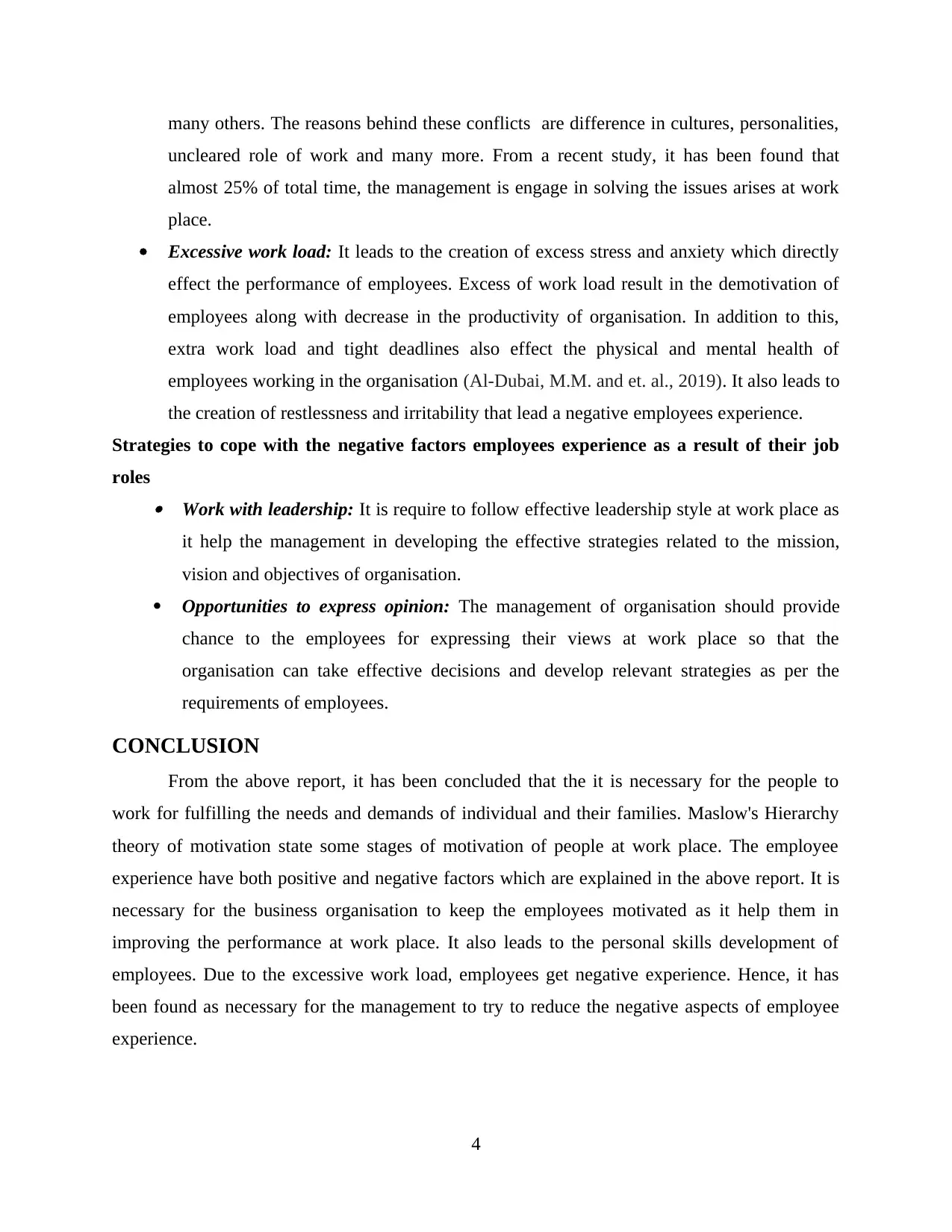
many others. The reasons behind these conflicts are difference in cultures, personalities,
uncleared role of work and many more. From a recent study, it has been found that
almost 25% of total time, the management is engage in solving the issues arises at work
place.
Excessive work load: It leads to the creation of excess stress and anxiety which directly
effect the performance of employees. Excess of work load result in the demotivation of
employees along with decrease in the productivity of organisation. In addition to this,
extra work load and tight deadlines also effect the physical and mental health of
employees working in the organisation (Al-Dubai, M.M. and et. al., 2019). It also leads to
the creation of restlessness and irritability that lead a negative employees experience.
Strategies to cope with the negative factors employees experience as a result of their job
roles Work with leadership: It is require to follow effective leadership style at work place as
it help the management in developing the effective strategies related to the mission,
vision and objectives of organisation.
Opportunities to express opinion: The management of organisation should provide
chance to the employees for expressing their views at work place so that the
organisation can take effective decisions and develop relevant strategies as per the
requirements of employees.
CONCLUSION
From the above report, it has been concluded that the it is necessary for the people to
work for fulfilling the needs and demands of individual and their families. Maslow's Hierarchy
theory of motivation state some stages of motivation of people at work place. The employee
experience have both positive and negative factors which are explained in the above report. It is
necessary for the business organisation to keep the employees motivated as it help them in
improving the performance at work place. It also leads to the personal skills development of
employees. Due to the excessive work load, employees get negative experience. Hence, it has
been found as necessary for the management to try to reduce the negative aspects of employee
experience.
4
uncleared role of work and many more. From a recent study, it has been found that
almost 25% of total time, the management is engage in solving the issues arises at work
place.
Excessive work load: It leads to the creation of excess stress and anxiety which directly
effect the performance of employees. Excess of work load result in the demotivation of
employees along with decrease in the productivity of organisation. In addition to this,
extra work load and tight deadlines also effect the physical and mental health of
employees working in the organisation (Al-Dubai, M.M. and et. al., 2019). It also leads to
the creation of restlessness and irritability that lead a negative employees experience.
Strategies to cope with the negative factors employees experience as a result of their job
roles Work with leadership: It is require to follow effective leadership style at work place as
it help the management in developing the effective strategies related to the mission,
vision and objectives of organisation.
Opportunities to express opinion: The management of organisation should provide
chance to the employees for expressing their views at work place so that the
organisation can take effective decisions and develop relevant strategies as per the
requirements of employees.
CONCLUSION
From the above report, it has been concluded that the it is necessary for the people to
work for fulfilling the needs and demands of individual and their families. Maslow's Hierarchy
theory of motivation state some stages of motivation of people at work place. The employee
experience have both positive and negative factors which are explained in the above report. It is
necessary for the business organisation to keep the employees motivated as it help them in
improving the performance at work place. It also leads to the personal skills development of
employees. Due to the excessive work load, employees get negative experience. Hence, it has
been found as necessary for the management to try to reduce the negative aspects of employee
experience.
4
⊘ This is a preview!⊘
Do you want full access?
Subscribe today to unlock all pages.

Trusted by 1+ million students worldwide
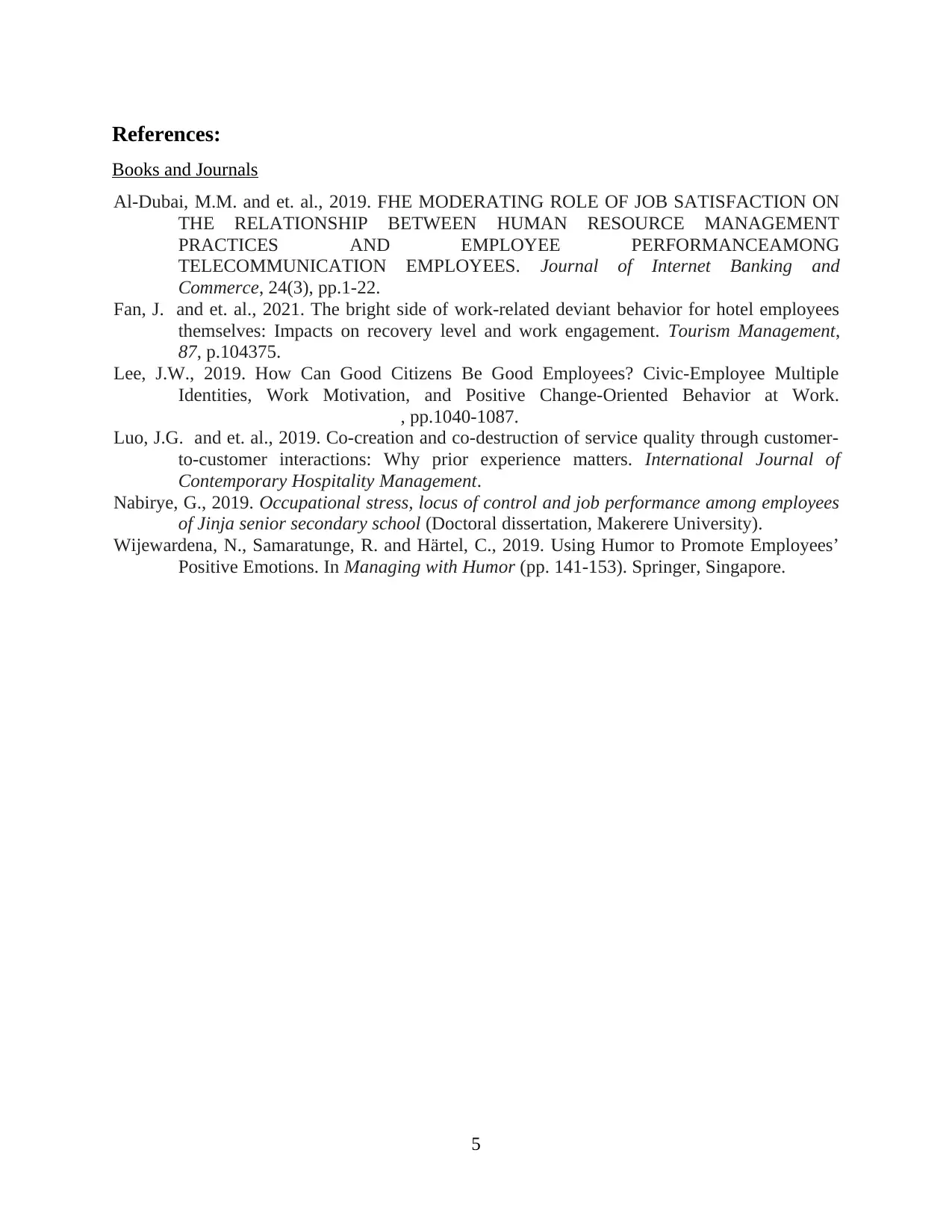
References:
Books and Journals
Al-Dubai, M.M. and et. al., 2019. FHE MODERATING ROLE OF JOB SATISFACTION ON
THE RELATIONSHIP BETWEEN HUMAN RESOURCE MANAGEMENT
PRACTICES AND EMPLOYEE PERFORMANCEAMONG
TELECOMMUNICATION EMPLOYEES. Journal of Internet Banking and
Commerce, 24(3), pp.1-22.
Fan, J. and et. al., 2021. The bright side of work-related deviant behavior for hotel employees
themselves: Impacts on recovery level and work engagement. Tourism Management,
87, p.104375.
Lee, J.W., 2019. How Can Good Citizens Be Good Employees? Civic-Employee Multiple
Identities, Work Motivation, and Positive Change-Oriented Behavior at Work.
한한한한한한 한한한한한한한한한, pp.1040-1087.
Luo, J.G. and et. al., 2019. Co-creation and co-destruction of service quality through customer-
to-customer interactions: Why prior experience matters. International Journal of
Contemporary Hospitality Management.
Nabirye, G., 2019. Occupational stress, locus of control and job performance among employees
of Jinja senior secondary school (Doctoral dissertation, Makerere University).
Wijewardena, N., Samaratunge, R. and Härtel, C., 2019. Using Humor to Promote Employees’
Positive Emotions. In Managing with Humor (pp. 141-153). Springer, Singapore.
5
Books and Journals
Al-Dubai, M.M. and et. al., 2019. FHE MODERATING ROLE OF JOB SATISFACTION ON
THE RELATIONSHIP BETWEEN HUMAN RESOURCE MANAGEMENT
PRACTICES AND EMPLOYEE PERFORMANCEAMONG
TELECOMMUNICATION EMPLOYEES. Journal of Internet Banking and
Commerce, 24(3), pp.1-22.
Fan, J. and et. al., 2021. The bright side of work-related deviant behavior for hotel employees
themselves: Impacts on recovery level and work engagement. Tourism Management,
87, p.104375.
Lee, J.W., 2019. How Can Good Citizens Be Good Employees? Civic-Employee Multiple
Identities, Work Motivation, and Positive Change-Oriented Behavior at Work.
한한한한한한 한한한한한한한한한, pp.1040-1087.
Luo, J.G. and et. al., 2019. Co-creation and co-destruction of service quality through customer-
to-customer interactions: Why prior experience matters. International Journal of
Contemporary Hospitality Management.
Nabirye, G., 2019. Occupational stress, locus of control and job performance among employees
of Jinja senior secondary school (Doctoral dissertation, Makerere University).
Wijewardena, N., Samaratunge, R. and Härtel, C., 2019. Using Humor to Promote Employees’
Positive Emotions. In Managing with Humor (pp. 141-153). Springer, Singapore.
5
1 out of 7
Related Documents
Your All-in-One AI-Powered Toolkit for Academic Success.
+13062052269
info@desklib.com
Available 24*7 on WhatsApp / Email
![[object Object]](/_next/static/media/star-bottom.7253800d.svg)
Unlock your academic potential
Copyright © 2020–2026 A2Z Services. All Rights Reserved. Developed and managed by ZUCOL.



